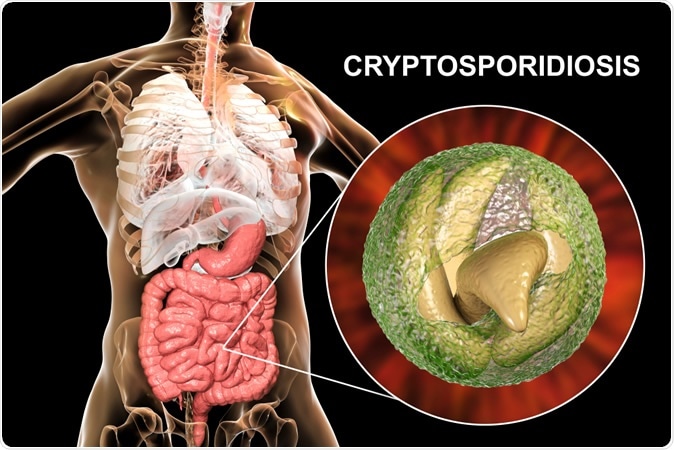Summers get along best with swimming pools, spas and other water play areas. The Centre for Disease Prevention and Control (CDC) USA has warned that these pools could be the focal point of spread of certain bacteria, parasites and virsues.
The CDC page lists some of the common do’s and don’t’s regarding using pools in summers. One of the suggestions include not allowing children to use the pool if they have diarrhoea. The page warns that one child with diarrhoea in the swimming pool could spread diarrhoea causing bacteria to the others. These include Cryptosporidium, Giardia, Shigella, norovirus, and E. Coli. Other swimmers swallowing mouthfuls of the contaminated water are likely to get infected with these bacteria, parasites and viruses, the CDC warns.

Cryptosporidiosis, a diarrheal disease caused by Cryptosporidium parvum protozoan. 3D illustration showing release of parasite sporozoites from oocyst inside small intestine - Illustration Credit: Kateryna Kon / Shutterstock
The experts assure that most of these microbes are killed by the common disinfectants in the pool including chlorine or bromine. However, Cryptosporidum has been shown to be resistant to these disinfectants and can even survive in the chlorinated water for more than a week. Most diarrheal outbreaks in the US have been linked to Crypto infections in the summer season says CDC.
Crypto infection can lead to a condition called cryptosporidiosis that causes profuse watery diarrhoea in children as well as adults. The diarrhoea may last for up to three weeks, say experts. Among children, pregnant women and those with a depressed immune system, the risk of getting crypto diarrhoea and its severely is also greater.
A statement from the CDC says, “The number of treated recreational water-associated outbreaks caused by cryptosporidium drives the summer seasonal peak in both waterborne cryptosporidiosis outbreaks and cryptosporidiosis outbreaks overall.” Since 2009 there has been one Crypto associated death says the CDC. This death was due to transmission of the infection to the patient in hospital settings says the CDC. Between 2009 to 2017 there have been 287 hospitalizations due to Crypto diarrhoea says the CDC.
The CDC released a report last Friday that showed that there have been 444 cryptosporidiosis outbreaks from 40 states and Puerto Rico between 2009 to 2017 making 7,465 people ill with the infection. More than one third of the cases were traced back to contaminated water from swimming pools, water playgrounds and kiddie pools. Rest of the cases were due to swimming in untreated water from lakes etc. Child care settings, unpasteurized milk and apple cider and animal handling too were reasons for spread of crypto infection says the CDC. The months of July and August were recorded as the highest in terms of cases with around 80 cases reported during these months in 2016. Between 2009 and 2017, there has been a 12.8 percent rise in number of cases of cryptosporidium says the CDC.
The CDC officials report that the rise in number of cases could be also due to better and early detection of the organism among the patients.
The CDC page lists out the do’s and don’t’s of swimming;
- Not to allow kids and adults with diarrhoea to get into pools. The CDC advises that a person needs to wait at least 2 weeks after the diarrhoea has resolved to get into pools. A survey from the Water Quality & Health Council last month said that around one quarter of Americans enter into swimming pools within an hour of having diarrhoea.
- Last inspection results need to be checked online of onsite about possible contamination and disinfection
- Test strips could be purchased from hardware stores to look for adequate chlorine or bromine levels as well as correct pH of the water. The CDC suggests a free chlorine concentration of at least 1 ppm in pools and water playgrounds and Bromine concentration of at least 3 ppm in pools and water playgrounds along with a pH of 7.2–7.8.
- The page advises all to shower for at least a minute before entering the pool to wash away the dirt and sweat
- It advises not to swallow water
- It advises not to urinate in the water
- Diapers should be changed away from the pool region to prevent contamination, the CDC advises